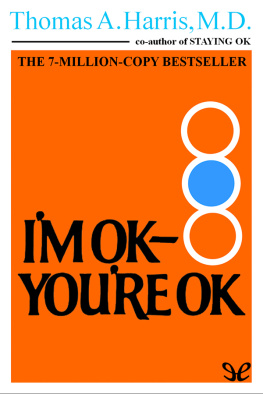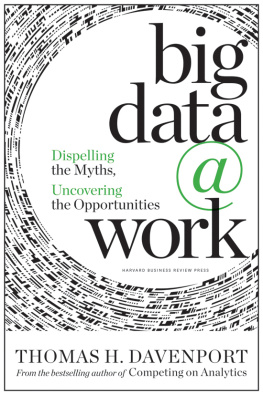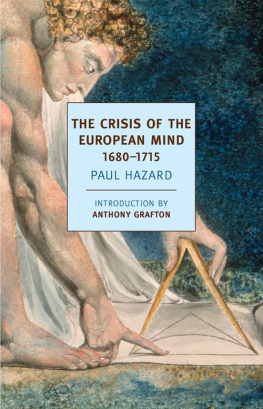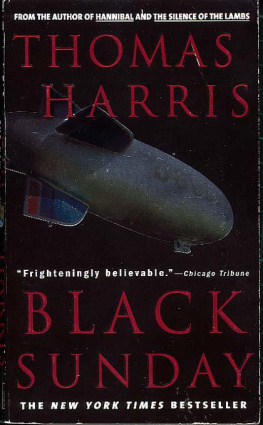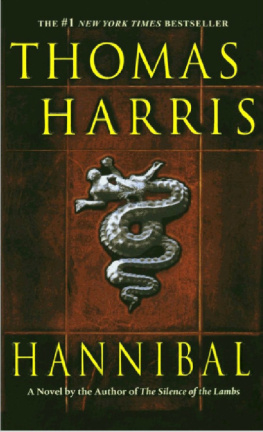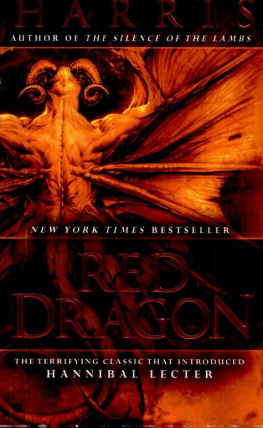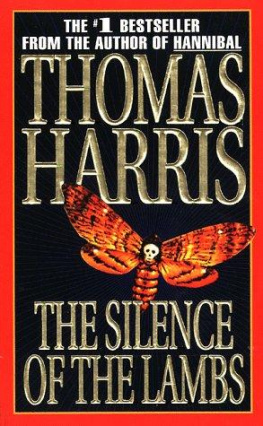Thomas Anthony Harris - I’m OK – You’re OK
Here you can read online Thomas Anthony Harris - I’m OK – You’re OK full text of the book (entire story) in english for free. Download pdf and epub, get meaning, cover and reviews about this ebook. year: 1969, publisher: ePubLibre, genre: Politics. Description of the work, (preface) as well as reviews are available. Best literature library LitArk.com created for fans of good reading and offers a wide selection of genres:
Romance novel
Science fiction
Adventure
Detective
Science
History
Home and family
Prose
Art
Politics
Computer
Non-fiction
Religion
Business
Children
Humor
Choose a favorite category and find really read worthwhile books. Enjoy immersion in the world of imagination, feel the emotions of the characters or learn something new for yourself, make an fascinating discovery.
- Book:I’m OK – You’re OK
- Author:
- Publisher:ePubLibre
- Genre:
- Year:1969
- Rating:5 / 5
- Favourites:Add to favourites
- Your mark:
- 100
- 1
- 2
- 3
- 4
- 5
I’m OK – You’re OK: summary, description and annotation
We offer to read an annotation, description, summary or preface (depends on what the author of the book "I’m OK – You’re OK" wrote himself). If you haven't found the necessary information about the book — write in the comments, we will try to find it.
I’m OK – You’re OK — read online for free the complete book (whole text) full work
Below is the text of the book, divided by pages. System saving the place of the last page read, allows you to conveniently read the book "I’m OK – You’re OK" online for free, without having to search again every time where you left off. Put a bookmark, and you can go to the page where you finished reading at any time.
Font size:
Interval:
Bookmark:

Transactional Analysis delineates three observable ego-states (Parent, Adult, and Child) as the basis for the content and quality of interpersonal communication. Happy childhood notwithstanding, says Harris, most of us are living out the NOT OK feelings of a defenseless child, dependent on OK others (parents) for stroking and caring. At some stage early in our lives we adopt a position about ourselves and others that determines how we feel about everything we do. And for a huge portion of the population, that position is IM NOT OK YOURE OK. This negative life position shared by successful and unsuccessful people alike, contaminates our rational Adult capabilities, leaving us vulnerable to inappropriate emotional reactions of our Child and uncritically learned behavior programed into our Parent. By exploring the structure of our personalities and understanding old decisions, Harris believes we can find the freedom to change our lives.
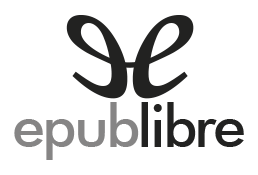
Thomas Anthony Harris
ePub r1.2
Readman 19.09.14
Original title: Im OK Youre OK
Thomas Anthony Harris, 1969
Cover design: Readman. Based on an original
Digital editor: Readman
ePub base r1.1
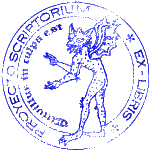

THOMAS A. HARRIS (April 18, 1910, San Antonio, Texas May 4, 1995, Sacramento, California) was a practising psychiatrist in Sacramento, California. He received his B.S. degree in 1938 from the University of Arkansas Medical School and his M.D. in 1940 from Temple University Medical School. In 1942 he began training in psychiatry at St Elizabeths Hospital in Washington, after which he served as a psychiatrist in the Navy. In 1947 he was appointed Chief of the Psychiatric Branch of the Bureau of Medicine and Surgery in the Navy Department. After retirement from the Navy as Commander, he taught at the University of Arkansas School of Medicine and then became Director of the Department of Institutions for the State of Washington. In 1956 he entered private practice in Sacramento. He was founder and President of the Institute for Transactional Analysis there, and a Director of the International Transactional Analysis Association.
I contradict myself. I am large. I contain multitudes.
Walt Whitman
T hroughout history one impression of human nature has been consistent: that man has a multiple nature. Most often it has been expressed as a dual nature. It has been expressed mythologically, philosophically, and religiously. Always it has been seen as a conflict: the conflict between good and evil, the lower nature and the higher nature, the inner man and the outer man. There are times, said Somerset Maugham, when I look over the various parts of my character with perplexity. I recognize that I am made up of several persons and that the person that at the moment has the upper hand will inevitably give place to another. But which is the real one? All of them or none?
That man can aspire to and achieve goodness is evident through all of history, however that goodness may be understood. Moses saw goodness supremely as justice, Plato essentially as wisdom, and Jesus centrally as love; yet they all agreed that virtue, however understood, was consistently undermined by something in human nature which was at war with something else. But what were these somethings?
When Sigmund Freud appeared on the scene in the early twentieth century, the enigma was subjected to a new probe, the discipline of scientific inquiry. Freuds fundamental contribution was his theory that the warring factions existed in the unconscious. Tentative names were given to the combatants: the Superego became thought of as the restrictive, controlling force over the Id (instinctual drives), with the Ego as a referee operating out of enlightened self-interest.
We are deeply indebted to Freud for his painstaking and pioneering efforts to establish the theoretical foundation upon which we build today. Through the years scholars and clinicians have elaborated, systematized, and added to his theories. Yet the persons within have remained elusive, and it seems that the hundreds of volumes which collect dust and the annotations of psychoanalytic thinkers have not provided adequate answers to the persons they are written about.
I stood in the lobby of a theatre at the end of the showing of the motion picture Whos Afraid of Virginia Woolf? and listened to a number of comments by people who had just seen the picture: Im exhausted! And I come to movies to get away from home. Why do they want to show something like that? I didnt get it; I guess you have to be a psychologist. I got the impression that many of these people left the theatre wondering what was really going on, sure there must have been a message, but unable to find anything relevant to them or liberating in terms of how to end fun and games in their own lives.
We are dutifully impressed by formulations such as Freuds definition of psychoanalysis as a dynamic conception which reduces mental life to an interplay of reciprocally urging and checking forces. Such a definition and its countless elaborations may be useful to the professionals, but how useful are these formulations to people who hurt? George and Martha in Edward Albees play used red-hot, gutsy, four-letter words that were precise and to the point. The question is, As therapists can we speak with George and Martha as precisely and pointedly about why they act as they do and hurt as they do? Can what we say be not only true but also helpful, because we are understood? Speak English! I cant understand a word youre saying is not an uncommonly held attitude towards persons who claim to be experts in the psychological fields. Restating esoteric psychoanalytic ideas in even more esoteric terms does not reach people where they live. As a consequence the reflections of ordinary folk are often expressed in pitiful redundancies and in superficial conversations with such summary comments as, Well, isnt that always the way? with no understanding of how it can be different.
In a sense, one of the estranging factors of the present day is the lag between specialization and communication, which continues to widen the gulf between specialists and non-specialists. Space belongs to the astronauts, understanding human behavior belongs to the psychologists and psychiatrists, legislation belongs to the congressmen, and whether or not we should have a baby belongs to the theologians. This is an understandable development; yet the problems of non-understanding and non-communication are so great that means must be devised whereby language can keep up with the developments of research.
In the field of mathematics an answer to this dilemma was attempted in the development of the new mathematics, now being taught in elementary schools throughout the country. The new mathematics is not so much a new form of computation as of communication of mathematical ideas, answering questions not only of what, but also of why, so that the excitement of going to the moon or using a computer will not remain exclusively in the realm of scientists but can also exist in comprehensible form for the student. The science of mathematics is not new, but the way it is talked about is new. We would find ourselves handicapped if we were still to use the Babylonian, Mayan, Egyptian, or Roman number systems. The desire to use mathematics creatively brought about new ways of systematizing numbering concepts. The new mathematics of today has continued this creative growth. We recognize and appreciate the creative thinking which the earlier systems represented, but we do not encumber todays work with those now less-effective methods.
Font size:
Interval:
Bookmark:
Similar books «I’m OK – You’re OK»
Look at similar books to I’m OK – You’re OK. We have selected literature similar in name and meaning in the hope of providing readers with more options to find new, interesting, not yet read works.
Discussion, reviews of the book I’m OK – You’re OK and just readers' own opinions. Leave your comments, write what you think about the work, its meaning or the main characters. Specify what exactly you liked and what you didn't like, and why you think so.

